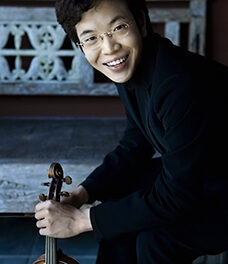Once again, Duke Performances has shown that, for them, it is not quite enough to book and present some of the greatest performing artists on the planet – although that in itself would be just fine. Instead, they become part of the creative process: commissioning new works and working with both Duke University and Durham to celebrate important milestones in the life of those communities. This program – “Enlightened Souls: Commemorating 50 Years of Black Students at Duke” – was part of the final weekend of a nine-month celebration honoring the integration of Duke in 1963. More than a year ago, Aaron Greenwald, the highly creative and culturally inclusive Director of Duke Performances, asked Billy Childs, the eclectic composer and performer, to write a piece for this celebration. His song cycle, Enlightened Souls, was the result and the featured work on the second half.
When banners first appeared last spring around the campus and articles began about this 50 year celebration, I was a bit taken aback by the tone. There seemed to be a self-congratulatory, pat-on-the-back ethos by the University that they had finally “allowed” African-Americans to matriculate in the relatively recent past. Thankfully, over these intervening months, that has changed considerably, and the emphasis shifted to the bravery and persistence of those first five undergraduate students from 1963 and the invaluable contributions made in 50 years by a previously-excluded class of citizens. Greenwald made a very profound and inclusive introduction emphasizing that this celebration is indeed for those “firsts” and everyone who came after them.
Music and social causes or celebrations have gone hand-in-hand since the first sounds were uttered. In the United States, these have primarily been of a liberal bent, most notably by singers like Pete Seeger and Woody Guthrie, advocating for workers and union rights, and a large contingent of civil rights musicians propelling the early 1960s civil rights movement. So it was quite appropriate that this tradition should continue with this program’s commissioned work. As if all this wasn’t enough, the chance to see and hear the Billy Childs Jazz Chamber Ensemble, Dianne Reeves, and the Ying Quartet on stage at the same concert was a once-in-a-lifetime opportunity.
Childs is an astoundingly prolific and diverse musician whose sterling resume has enough accomplishments to share with a dozen more people. For me, his most impressive talent is his ability authentically to combine jazz and chamber music. This is not as easy as it sounds. Although there have been some successes in the past, like the Modern Jazz Quartet‘s numerous collaborations and Charlie Parker’s incredible Charlie Parker with Strings, most of the time the jazz and classical world does not click authentically.
The first half of the concert featured works from previous Childs’ albums and started with his group: Bob Sheppard, saxophones, Brian Balde, drums, Larry Koonse, guitar, Hans Glawischnig, bass, and Carol Robbins, harp. The first piece was “Aaron’s Song,” named for Childs’ son. It was great to hear the harp in a jazz setting. Like the French horn and bassoon, the harp is very rarely used in a jazz setting. Childs’ writing for the instrument was revealing and added a new dimension to a standard jazz combo.
He then brought out the Ying Quartet for “Into the Light.” Childs wisely eschews any pretense that the members of this consummate quartet are jazz players and can effectively improvise but writes magnificent parts that they all play with complete mastery and style. Childs himself is a spectacular, virtuosic pianist. These works, however, did go on a bit too long, and after a while I began to admire the playing rather than enjoy it. Things slowed down for a nice change of pace with “The Red Wheelbarrow,” a lovely ballad featuring guitarist Koonse.
After a lengthy intermission, the main event arrived. Childs first acknowledged the presence of three of the first five African-American students admitted to Duke in 1963: Nathaniel White, Jr., Wilhelmina Reuben-Cooke, and Gene Kendall. He then gave some background to the origin of the commissioned work, Enlightened Souls, telling the audience that when approached by Aaron Greenwald, he felt that the importance of this made him conclude that a text was needed. He chose three poems: “The White House” by Claude McKay, “Revolutionary Letter #20” (“for Huey Newton”) by Diane di Prima, and an untitled poem by Walter Benton. Considering that this event was at least a year in the making, I don’t understand why the texts of these poems were omitted from the program – unless there were copyright issues.
Renowned jazz singer Dianne Reeves then joined the entire ensemble. She seemed to adapt her vocal character from swingin’ jazz diva to one more appropriate for the texts, although there were a few sections that involved scatting. Reeves did her best to enunciate the words but, as mentioned, the lack of published texts was a big detriment to a complete appreciation of this world premiere. As with many song cycles, upon first hearing, one usually doesn’t walk away humming any memorable tunes, but Childs’ impeccable orchestration of this unique ensemble was memorable and begs additional hearings.
This was a joyous, proud celebration, and the credit should be squarely placed on the real heroes: brave, persistent individuals, not institutions. It was a small but wonderful gesture of honor and appreciation that such musical luminaries took part in this event.











